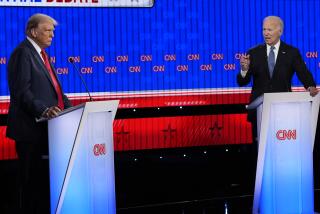Readers React: Living with political lying
The Times is correct that “often it will be a matter of debate whether a characterization of a candidate’s record is false or merely misleading.” (“When it comes to politics, there’s no need to outlaw lying,” Editorial, June 17)
Particularly in a world of growing political polarization, to outlaw lying about an opponent is to effectively outlaw debate. Both major parties tend to diverge so strongly on a contentious issue such as abortion, for example, that it is not difficult to imagine, say, an antiabortion Republican accusing a vociferous pro-abortion rights Democrat of lying when she declares that life does not begin at conception.
Or vice versa. Such accusations serve only to distract from the debate at hand.
What constitutes lying and what constitutes legitimate disagreement is too gray an area to allow sparring politicians to define.
Lucian McMahon
Arlington, Va.
Police the liars? How did that work out for the millions of us advocating for equality as we tried to negate the lies coming from the pro-Proposition 8 campaign in 2008? There are people who, six years later, still hold to be true the falsehoods perpetuated by the television ads and mailers of the campaign’s deep pockets.
The damage is done, is nearly irreparable and causes harm to this day. Shame on the Supreme Court for clearing the way for the continuance of fabrication within political campaigns.
Couple that decision with the Citizens United and McCutcheon vs. Federal Election Commission rulings, and we’re all in for Proposition 8-style campaigns on any subject matter the extreme right deems worthy of a lie. Again and again, the damage will be done as many take as gospel untruthful propaganda.
Sheila Alberg
Bakersfield
In the world of the pre-Roberts court, your editorial about criminalizing false political advertising would be on target. But since Citizens United and its progeny under this Supreme Court, money is apparently king.
If a well-funded group (spelled K-O-C-H) decides to place ads deliberately misrepresenting a candidate or ballot measure, how does the citizen candidate ever have the funds to publicly correct the defamation?
Your position would give license for more negative (and deliberately false) political ads and still more expensive campaigns.
And, by the way, Justice Anthony M. Kennedy’s line that “the remedy for speech that is false is speech that is true” reminds me of the National Rifle Assn.’s phrase about good and bad guys with guns. That also sounded good until the Las Vegas good guy with a gun was killed and the Seattle good guy with pepper spray became a hero.
So much for the turn of a phrase.
Ken Goldman
Beverly Hills
More to Read
A cure for the common opinion
Get thought-provoking perspectives with our weekly newsletter.
You may occasionally receive promotional content from the Los Angeles Times.










